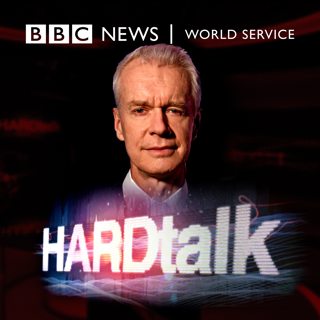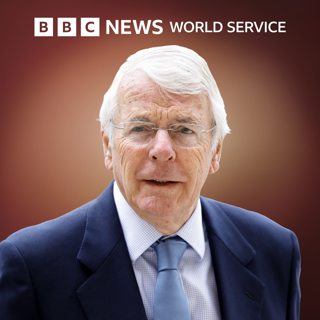
Xavier Rolet - Chief Executive, London Stock Exchange Group
The 2008 banking crash prompted a prolonged crisis of confidence in the financial institutions and markets that underpin Western capitalism. Governments on both sides of the Atlantic have tried to recalibrate the balance between risk and reward and to encourage genuine wealth creation rather than short term speculation. Xavier Rolet is the CEO of the London Stock Exchange Group. Have financial markets learned the right lessons from recent history?(Image: Xavier Rolet, Chief Executive of the London Stock Exchange (LSE). Copyright London Stock Exchange press office handout)
7 Sep 201223min

Raymond Tshibanda - Minister for Foreign Affairs, Democratic Republic of Congo
The grim threat of renewed conflict hangs over the Democratic Republic of Congo. An armed rebellion in the East - on the Rwandan border - has already forced hundreds of thousands to flee. The DRC army is in disarray and the Kinshasa government has been undermined by allegations of electoral fraud and corruption. Stephen Sackur talks to the Minister for Foreign Affairs, Raymond Tshibanda. What hope is there for the Democratic Republic of Congo?(Image: Democratic Republic of Congo's Minster for Foreign Affairs Raymond Tshibanda. Credit: JUNIOR D.KANNAH/AFP/GettyImages)
5 Sep 201223min

Tarek al-Hashimi - Vice President of Iraq
Tarek al-Hashimi is in a very strange position: he is Iraq's vice president but right now he is a de facto fugitive in Turkey. He is being tried in absentia on charges of sponsoring death squads inside Iraq. The conflict in Syria is fuelling sectarian tension across the Middle East. In neighbouring Iraq a political and security crisis has deepened in the last year. What hope is there for justice or peace in a region in the grip of sectarian strife?(Image: Iraq's Vice President Tarek al-Hashimi. Credit: AFP / Getty Images)
30 Aug 201223min

Brian Sayers – Syrian Support Group
While some Arab states are actively funding the Syrian opposition, the West has publicly refused to provide arms. The US, in particular, has been criticised for its reluctance to get involved beyond talks and diplomacy. Brian Sayers is a lobbyist for a US-based non-profit organisation. The Syrian Support Group has been given the green light by the US Treasury to raise money for the Free Syrian Army despite the fears that the FSA might have links to extremist groups in the region. The Syrian Support Group insists that the money raised will not get into the wrong hands. How can they be sure?(Image: Brian Sayers)
28 Aug 201223min

Maajid Nawaz - Chairman of Quilliam, counter extremisim organisation
Maajid Nawaz is a British born Muslim who became a radical Islamist. He was arrested and imprisoned in Hosni Mubarak's Egypt but when he emerged from prison he renounced his former views and launched a campaign to counter Islamist ideology. To some he's a truth teller, to others a traitor. Stephen Sackur asks him to explain his extraordinary transformation.
27 Aug 201223min

Rob Davies - South Africa's Minister for Trade and Industry
Stephen Sackur talks to Rob Davies, South Africa’s Minister for Trade and Industry.The labour unrest in South Africa’s platinum mines has claimed the lives of dozens and produced the kind of violence not seen since apartheid. The strike has driven up the cost of platinum prices and shaken investor confidence. It has also drawn the world’s attention to the low wages and poor working conditions of South Africa’s miners. Is the call to invest in Africa’s biggest economy being stifled by the rage against social and economic disparity?(Image: Rob Davies addressing the media at the TIME / FORTUNE / CNN Global Forum in June 2010. Credit: Getty Images)
24 Aug 201223min

Angélique Kidjo - Musician and Activist
Angélique Kidjo has been hailed as Africa's premier diva, known for her passionate voice and fierce determination to help African girls fulfil their potential. Three decades ago she left her home continent and became an international star. Stephen Sackur asks Kidjo how much Africa and its music scene has changed between then and now.(Image: Angelique Kidjo performing in 2010. Credit: AFP / Getty Images)
22 Aug 201223min

Lord Hanningfield - Former Conservative Peer
The expenses scandal tarnished those at the very heart of British democracy. Some politicians in the so-called Mother of Parliaments were shown to be greedy and a few criminal. A handful went to jail and one of those is the former Conservative peer and former leader of Essex County Council Lord Hanningfield. So why did he do it? Is there something fundamentally wrong with Britain's political culture and with those who go into politics? And what lessons can a lawmaker learn from prison?(Image: Lord Hanningfield)
19 Aug 201223min






















